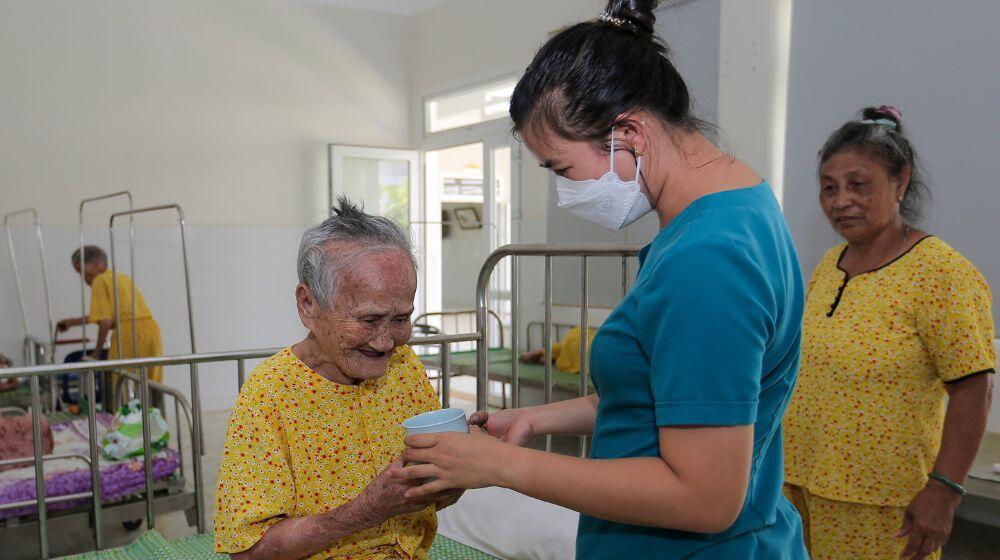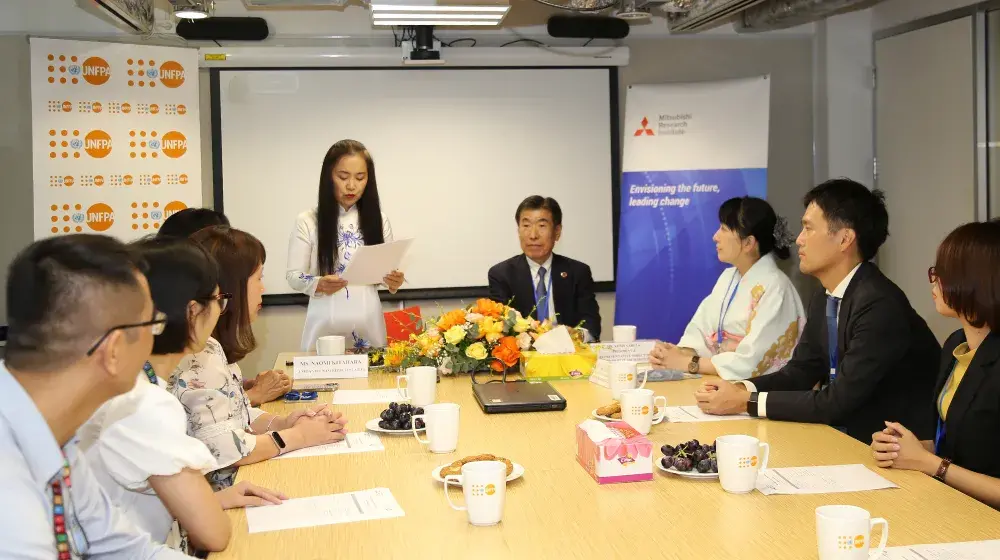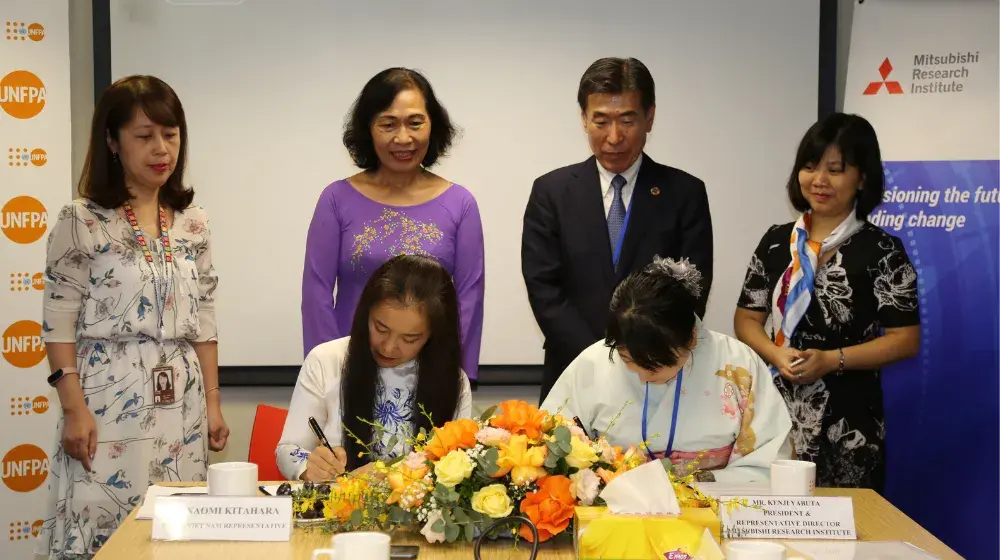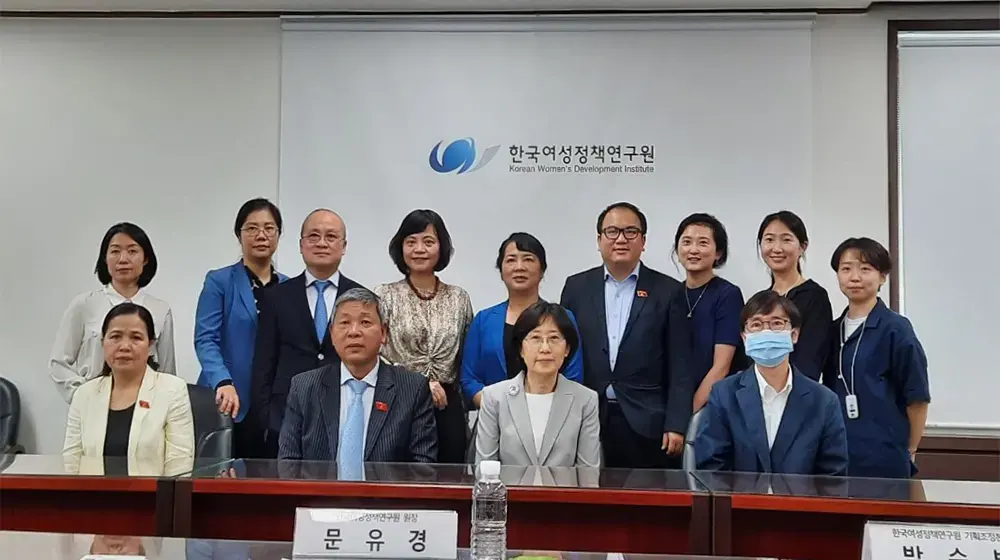“We, older persons, what we need is a nice and comfortable living environment. Here, the centre is as beautiful as a park and as clean as a hospital. We want to live here forever,” says Mrs. Nguyen Thi Hong Thuy, 74 years old from the Social Protection Centre in Viet Nam’s Thanh Hoa province.
For her part, Mrs. Tran Thi Tam, an 80-year old lady from Long Ho district, Vinh Long province says: “The medical staff visits me and reminds me when and how to take my medications correctly. I was advised to do exercise regularly. Their advice is very helpful. My health and my life are much better.”
Mr. Nguyen Phu Ban, 79, from the Danang city is living with his wife, who is 78 years old, and he says: “Medical staff visits us and does medical check-ups. We are advised on what food is suitable for older persons like us, and what we should do to have an independent, joyful and healthy life. We are reminded to do regular exercises”.
They are among more than 1,500 older persons who have received care needs screening and individual care plans under the framework of the piloted implementation of the integrated care model for older persons in Danang city and 4 provinces. It was piloted by the Ministry of Labour, Invalids and Social Affairs of Viet Nam with support from UNFPA, funded by the Government of Japan and the UN Joint SDGs Fund.
After 6 months of piloting, the integrated care model introduced a new approach and new tools for providing care for older persons who are living in the state social protection and social work centres. It was also tried out as a community-based care model for older persons.
Mr. Nguyen Phu Ban and his wife feel healthier, thanks to the home-based care programmes designed under the framework of the piloted model of integrated care for older persons. The couple is now taking care of themselves, and can continue doing farming to earn a living, while their 5 children are living far away on their own.
Mr. Nguyen Phu Ban says: “I am a member of the Older Persons’ Union in Hoa Tien commune, so my wife and I are visited regularly by the local medical staff, sent by the piloted project. We get timely advice on any health issues that occur. The local Association for Older Persons is also supported by the model. Many great activities for older persons have been organized to make us feel that we are not useless, and we don’t have to depend on our children and grandchildren.”
Not only the older persons, but more than 1,000 care staff at social protection and social work centres in Danang city and 4 piloted provinces, as well as home-caregivers of older persons have been trained in responding to COVID-19 and providing higher quality care for older persons in the context of COVID-19 pandemic and the new normal. The model also enhanced the capacity of social care at both national and provincial levels.
The Director of the Social Protection Centre of Danang city Mr. Nguyen Cong Thanh stressed that the model has trained his staff with useful skills based on international standards, and improved the quality of care at his centre.
Mr. Nguyen Cong Thanh confirmed: “After joining the piloted implementation of the integrated care model for older persons, I learnt that older persons need to receive not only health care, but also physical and mental care. Improving communication skills with older persons is also important. We need to have intimate conversations with them to understand what they really need, to comfort them and stimulate to lead a happier and healthier life.”
The care staff at the Social Protection Centre of Danang, Ms. Nguyen Hang Linh, shared the same views as her director. She is now very confident when providing care to older persons. She added: “Previously, I provided care following my instincts. Now I’m more professional. Thanks to the model’s training courses on communication skills, I learnt how to talk with older persons and how to inspire them to talk. For me, such communications skills are really important, because many older persons are reluctant to share what they really think.”
The Deputy Director of the Social Protection Department of the Ministry of Labour, Invalids and Social Affairs, Mr. Nguyen Ngoc Toan, confirmed that the integrated care model for older persons has proved to be effective in terms of accessibility and resource mobilisation. He also stressed the need for communication activities to raise public awareness, and for more training courses to further improve care provision skills.
The UNFPA Representative for Viet Nam Ms. Naomi Kitahara strongly believes that the integrated care model for older person was built toward ensuring the quality and accessibility of care services for all groups of older persons, especially the poor, disabled, and vulnerable older persons. It also aims to reduce the burden of women and caregivers, and to create support mechanisms to empower women.
Thus, UNFPA continues supporting the Ministry of Labour, Invalids and Social Affairs to replicate the model to other provinces and cities. This model constitutes an important step towards the development of a comprehensive care ecosystem for older persons in Viet Nam, offering a wide range of options for each stage of senior care, including home care services, community services, continuing care retirement communities, nursing facilities, hospital care services, and more.
Older persons in Viet Nam:
- In 2021, older persons (aged 60 and above) accounted for 12.8% of the total population (12.6 million people) in Viet Nam, and the country will transition from an aging to an aged country by 2036.
- About 11.7 per cent of the older population (or 1.47 million older persons) had at least one functional disability (vision; hearing; mobility; cognition; and/or communication).





